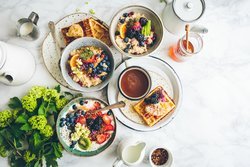Marie-Josee Denis

IS WEIGHT LOSS LINKED TO YOUR GUT HEALTH?
According to the most recent studies (1) , rapid and lasting weight loss is linked to better health of our intestines and digestive tract. In addition, we would gain a better mood, more energy and an improvement of our mental functions (2) .
This intestinal and digestive environment is referred to as the microbiota, a concept that is more encompassing than the intestinal flora. Scientists use the analogy of an ecosystem to describe it, given the number of microorganisms (yeast, bacteria) that reside there. (3) In fact, a thousand billion bacteria are believed to live in our intestine.
This research also revealed that an imbalance in the microbiota often led to weight gain even if the people concerned had not changed their diet or physical activity. On the contrary, when the microbiota is balanced, people often lose weight, sometimes without even changing their habits.
It goes without saying that microorganisms play an essential role in the way we extract calories from our food, make vitamins, and have a profound effect on our metabolism. Thus, when our metabolism is stimulated and works at full capacity, we lose weight durably, without any particular effort. Whereas if it is slowing down, it tends to store fat while keeping the extra kilos, even if you reduce calories and increase your physical activity (4).
Other properties of these micro-organisms; they would contribute to regulate our immune system, and would exert an influence on the hormones responsible for satiety and hunger. In addition, they have a very strong impact on neurotransmitters, the chemical messengers in the brain that control mood, energy levels, and mental functions.
Furthermore, if we end up with an unbalanced microbiota we host a disrupted immune system, so a person can suffer from inflammation, a kind of immune system reaction that can lead to weight gain. It is then a question of too much intestinal permeability (5) .
Other symptoms can include headaches, difficulty concentrating, skin problems, anxiety and insomnia, which is why it is important to rebalance your microbiota.
Foods that can trigger adverse reactions in the immune system include:
gluten (a protein found in wheat, rye, barley, and oats)
cow's milk products
Soy
peanuts
corn
sulphites
nitrites
monosodium glutamate
certain meats.
To reach your weight loss goal, here are a few tips (6) that you can try to integrate into your daily routine (they can also alleviate discomforts such as gastric reflux):
Focus on 80% of your plate (7): multicolored vegetables, fruits, legumes, raw nuts (a handful per day is enough) using good fats such as cold-pressed oils (olive, coconut, sunflower).
Prefer 20% of the plate: meats (preferably from small farms or organic): beef, shellfish, fish without mercury, chicken. Cook meat at low intensity (gentle steam) because this reduces their potential harmfulness (8) . Red meat, once every two weeks (9).
Reduce unrefined grains (Quinoa, whole rice, buckwheat), eggs, potatoes.
Avoid wheat and cow's milk products, soy, fried foods, alcohol, trans fat, sugar, refined flours, juice (except homemade smoothies), peanut butter (replace with almond butter: source of calcium), canola oil, iceberg lettuce, corn, ketchup, deli or processed meat.
Try fermented foods such as miso, tamari, kombucha, fermented vegetables (e.g. sauerkraut), Kimchi, fruit kefir, dried fermented organic rice - rich in enzymes, beneficial bacteria, minerals and trace elements. (10)
Treat yourself to a healthy appetizer: lacto-fermented vegetable juice, green juice, cider vinegar syrup (one teaspoon of vinegar for one glass of water), homemade lemonade.
Consumption of quality probiotics can be beneficial.
Stay well hydrated between meals (1.5 liters/day): water, herbal tea (e.g. fennel)
Take meals in a relaxed manner and chew well to the point of making the food liquid. Stay seated for 10 minutes after the meal.
Avoid snacking throughout the day
Spices: take advantage of the benefits of cinnamon, turmeric and herbs by incorporating them into your dishes (1 tsp. to 2 tsp. per dish) mint and nettle), lemon water or chlorophyll
Stop before you are completely full.
Eat until you feel 80% full.
Suggestions for meals
Breakfast (7am to 9am):
Try Fruit Yum (see recipe at www.mariejoseedenis.ca ) (source: www.bainsderivatifs.fr/portfolio-item/miam- o-fruit/)
Green juice/smoothies with fruit (e.g. kale, pineapple and banana) mix with plant milk then add 1 tsp of each: hemp seeds, chia and inulin/jerusalem artichoke powder (11).
Chia and hot plant milk with fruit
Pancakes (made with gluten free flour, or buckwheat) and fruit
Lunch (11:30 to 1:30):
Salad with rainbow colored vegetables with a good dressing (organic first cold pressed oil with lemon and aromatics. A handful of quinoa or organic animal or vegetable protein.
Dinner (5:30-7:30 pm):
Try new recipes (www.mangersantebio.org/recettes): vegetable stir fry, shepherd's pie with lentils, meal salad, meal soup (vegetables and quinoa/lentils), gluten-free pasta with homemade pesto.
Healthy chocolate mousse (see www.mariejoseedenis.ca)
Get inspired by healthy recipes on the internet!
Other tips as needed
To avoid constipation :
1 tbsp psyllium in at least 1/2 cup of water (or kambucha/kefir) mix well and swallow quickly otherwise a gel texture is created. In the morning and/or evening.
To prevent acid reflux episodes:
1 teaspoon of apple cider vinegar in half a glass of water before a meal (supper or lunch)
1 tbsp. organic sauerkraut juice
Sprinkle your dishes with nutritional yeast (source of vitamin B)
Choose organic broth - no MSG
Instead of soy sauce, try Bragg or Tamari
The tips listed are general. Every metabolism is different. More personalized guidance can be provided through naturopathic consultations.
References
(1) Dr. Raphaël Kellmann: When the gut gets involved... Adopt the microbiotic diet to boost your body and get back on track. Larousse. 2015. Enterologist and nutritionist, pioneer of "global medicine", he is the first to have designed a diet taking into account recent discoveries on the functioning of the microbiota.
(2) Idem p.14
(3) Idem p.14
(4) Idem p.15
(5) "The leaky gut is believed to be responsible for all autoimmune diseases and more. More than two hundred studies have been published on this subject in the last year. Among the diseases listed in Clinical Gastroenterology and hepatology and gut: Alzheimer's, anxiety, depression, ADHD, fibromyalgia, candidiasis, etc." from an article by: Renaud, Nicole: Le Monde au naturel. When eating rhymes with health. Volume 5. Issue 37. April 2017.
(6) The advice listed is general. Every metabolism is different. More personalized guidance can be offered through naturopathic consultations.
(7) Joyeux, Henri author of Changez d'alimentation. digestive and gynecological surgeon, oncologist - Conference April 29, 2017 - This suggests the proportions of 80% vegetables, fruits and legumes and 20% organic meats preferably. He suggests gentle steaming for meat to avoid overcooking, which would promote glycotoxins, too large molecules (antigens) that our enzymes do not digest.
(8) Lagacé, Jacqueline PhD: A targeted diet to preserve or restore gut health. Fides 2016 read p. 88 and following for more details
(9) idem p.89-90 Real prosciotto such as raw ham processed in a salt brine without nitrate and nitrite would be acceptable.
(10) Vegetable-based ones are healthier than animal-based dairy products. Buy them at health food stores or make them yourself with this good reference: Bureau, Sébastien and Côté, David: Fermentation Revolution. 2017. Les éditions de l'homme.
(11) 1 tbsp of powdered Topinambur (best form of inulin that feeds good bacteria- It would promote the absorption of vitamin B and calcium) Put it in the smoothie or fruit yum.


